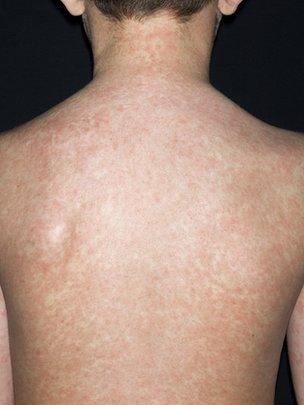'Death risk' in Swansea measles outbreak
- Published

Measles, characterised by a red rash, is not usually serious - but it can be
The number of people diagnosed with measles in the outbreak centred on Swansea is already well over 500. But thousands of unvaccinated children are still at risk - and experts fear a child may die.
A large-scale outbreak of this kind was bound to happen.
There has been a surge of measles cases in Swansea and its surrounding areas.
The outbreak began in November, and there is no sign it will end soon.
Children who have not received the MMR (measles, mumps, rubella) jab are most at risk.
But Dr Brendan Mason, an epidemiologist with Public Health Wales, said the problem was not with the current vaccination programme.
"For new mums, with children needing the jab at one year old, the vaccination rate is higher than it's ever been at around 95%.
"But for really a decade, uptake rates were much lower than they needed to be - and so now there are many who are susceptible to measles.
"At the start of this latest outbreak, there were around 7,000 children not fully immunised around Swansea."
Rates 'plummeted'
People used to be all too aware of the dangers of measles.
Prior to the introduction of the Measles vaccination in 1968, around 500,000 children caught measles and about 100 died as result each year in the UK.
But concerns over the jab's safety were raised a decade later when disgraced medic Andrew Wakefield published a since discredited paper in The Lancet suggesting MMR was linked with an increased risk of autism.
That paper, and the subsequent media coverage, led to immunisation rates plummeting.
From a high of 92% across the UK in 1995-6, it fell to an average of 80% in 2003-4.
As it became clear there was no evidence of the link suggested by Dr Wakefield, and messages about the importance of vaccination were accepted, immunisation rates increased - and have now largely recovered.
'Waiting for the spark'
Adam Finn, professor of paediatrics at the University of Bristol and an expert on immunisation says this is not the first time there has been a fallout from the Wakefield scare - but that it was likely to be the biggest.
"MMR rates have gone back up. But what nobody did was immunise those children who didn't get vaccinated when they were due between 1998 and 2008.
"Most of the parents who decided not to get their children immunised during that time probably forgot they'd made that decision.
"So you have this large population of susceptible children waiting for measles to turn up - we were just waiting for the spark."
Measles is caused by a virus spread in droplets and is easy to catch if you haven't been vaccinated.
While it isn't usually serious, it can be.
Serious long-lasting complications including nervous system disorders and blindness and - very rarely - brain inflammation are possible.
And the death rate is around one in every 1,000 infected in developed countries.
Prof Finn said that meant that if the numbers in the Welsh outbreak continued to rise: "it's almost guaranteed a child is likely to die."
Dr Mason added: " When we get this number of cases, you really do run the risk of seeing fatalities."
He said they were seeing an increase in vaccination uptake after a "disappointing" response to appeals early in the outbreak.
But it isn't clear yet how many of the 7,000-strong at-risk group have now been fully vaccinated.
Dr Mason said it was a "great shame" this outbreak had occurred.
"It needn't have happened."
- Published3 April 2013